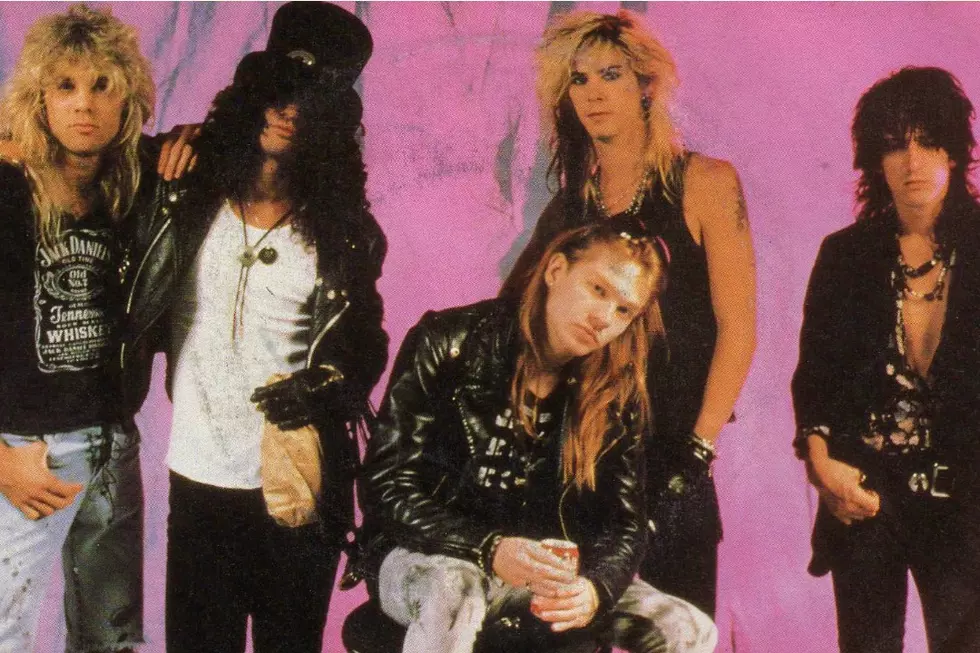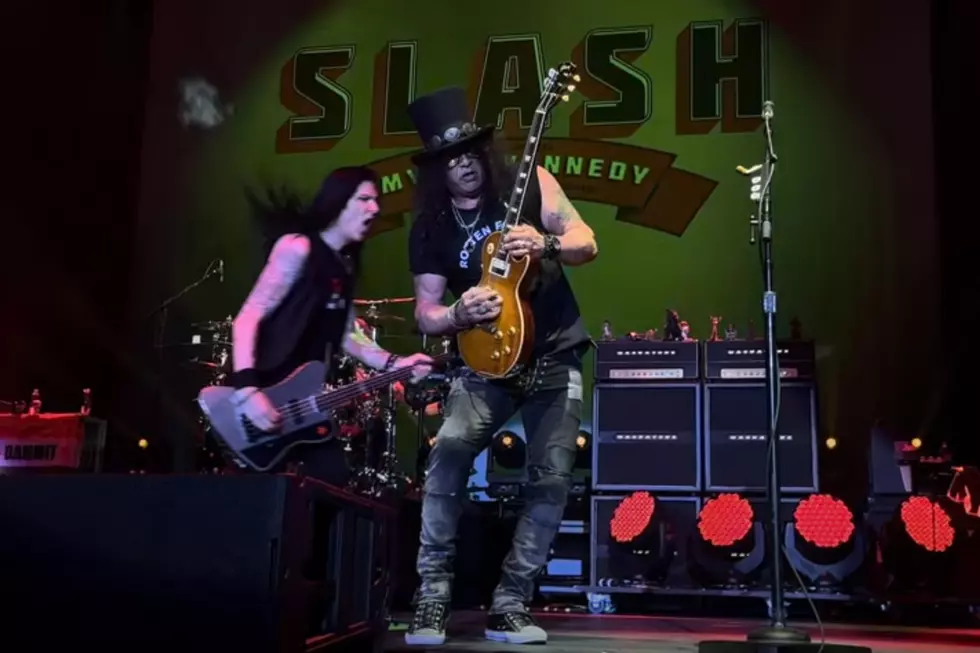
How Guns N’ Roses Ended Up Signing With Geffen Records
They started the year as just another group of Sunset Strip stragglers, but March 26, 1986, Guns N' Roses had joined the ranks of the record deal elite thanks to their freshly signed contract with Geffen Records.
GNR's Geffen deal represented the culmination of a slow reversal of fortune that took several years and countless gigs in seedy bars. Before the decade was over, they'd become one of the biggest rock bands in the world, but it took a lot of time — both before and after signing their names to the label's contract.
Much of the band's early support came courtesy of manager Vicky Hamilton, who'd worked as a consultant for Mötley Crüe and had a hand in helping Poison land their first deal, but was still looking for her first big score. As she later told it, her GNR duties included allowing the band to use her one-bedroom apartment as a playpen — not to mention constantly corralling singer Axl Rose, who'd already earned a reputation for ill-timed mercurial behavior.
While the group's grubby living situation added to the dangerous vibe that would ultimately help make them famous, it didn't help when it came to stuff like putting food (or other, less legal substances) on the table. For a long time, Guns N' Roses were basically broke — a situation Hamilton later claimed to remedy by hustling up a loan from Guitars R Us owner (and fellow Poison management vet) Howie Hubberman, who invested $25,000 in gear and expenses.
Along with Hamilton and Hubberman, GNR had a growing group of fans in their corner. Even in a scene clogged with hard rock hopefuls, the band managed to stand out, slowly cultivating a reputation for their powerful and unpredictable live show. One such fan, Vinyl Fetish owner Joseph Brooks, ultimately helped lead to their big break when he urged Geffen exec Tom Zutaut to catch a show.
Zutaut selected a gig at the Troubadour, and after spotting a number of other A&R men in attendance, he quickly exited, feigning indifference — but he left determined to get the group on his label.
"Axl didn't strike me as being particularly savvy or into his career. He was more like a wild animal from the African jungle," Zutaut later recalled. "I remember Axl saying to me the Monday after the show, 'Well, if you can get me a check for $75,000 by Friday, we'll sign with you.' It was unheard of. Then on Wednesday, he called me and said, 'Look, man, we told the A&R person at Chrysalis that if she walked naked down Sunset Boulevard from her office to Tower Records, we'd sign with her.' He was dead serious. And I remember thinking, 'My office is on Sunset — I'm going to have to watch until Friday at 6 o'clock, because if she does the nude walk, I'm going to lose the band.'"
Zutaut frantically put together a deal with the $75,000 advance Rose demanded, and after the deadline for the infamous walk came and went without any public nudity, he knew he'd landed the band. Yet even then, things didn't go exactly according to plan: Rose reportedly almost derailed the entire thing when he stormed out of his apartment in a huff after losing his contact lenses. He apparently believed someone was trying to sabotage him by making it so he couldn't read the contract, but the lenses eventually turned up and Slash was able to coax him back to the label offices, where — not for the last time — he'd kept people waiting for hours.
To their credit, Geffen didn't mind waiting. In fact, the label took an unusually patient approach with Guns N' Roses, waiting until the end of the year to put out the group's first Geffen release, a studio-created EP titled Live ?!*@ Like a Suicide and "released" by a made-up imprint.
Their full-length debut, Appetite for Destruction, wouldn't arrive until the following summer — and it didn't take off on the charts for months. All the while, Zutaut and the group's new manager, Alan Niven, were working behind the scenes to connect GNR with the worldwide audience they knew was waiting.
Of course, that breakthrough eventually came — and quickly helped knock the already unstable band off its axis, contributing to unhealthy lifestyles and an atmosphere of paranoid recrimination that led to a series of departures from the GNR camp. Drummer Steven Adler was fired in 1990, guitarist Izzy Stradlin left in 1991, and Niven found himself the casualty of a poisoned business relationship with Rose shortly after renegotiating the group's contract — a renegotiation that, according to Rose, ironically saw Niven lining the band members' pockets while Rose insulated himself against what he saw as divisive tactics on the manager's part by making sure his ownership of the Guns N' Roses name was legally binding.
"I had the bit about the name added in as protection for myself as I had come up with the name and then originally started the band with it," Rose told readers at MyGNRForum. "It was added to the contract and everyone signed off on it. It wasn't hidden in fine print, etc., as you had to initial the section verifying you had acknowledged it. Now, at that time I didn't know or think about brand names or corporate value, etc. All I knew is that I came in with the name and from day one everyone had agreed to it being mine should we break up and now it was in writing."
Eventually, Rose was left the last man standing from the classic GNR lineup, and although he's continued to soldier on with a series of tours and one long-delayed studio album, the group's early buzz still serves as a large portion of the Guns N' Roses mystique — and has everything to do with the anticipation for the partial reunion tour scheduled for 2016. Years after his ignominious firing, even Niven found it impossible to deny the power of the band that walked into Geffen's offices in 1986.
"Part of the appeal of the band was the fact that it was a train wreck," Niven told Loudwire. "The sense of spontaneity that they had contrasted magnificently with the contrivance of so many other bands. When they held it together onstage, they were fantastic. They were a destructive band that somehow sounded fucking awesome."
Every Guns N' Roses Lineup Change (We Think)
More From Ultimate Classic Rock









